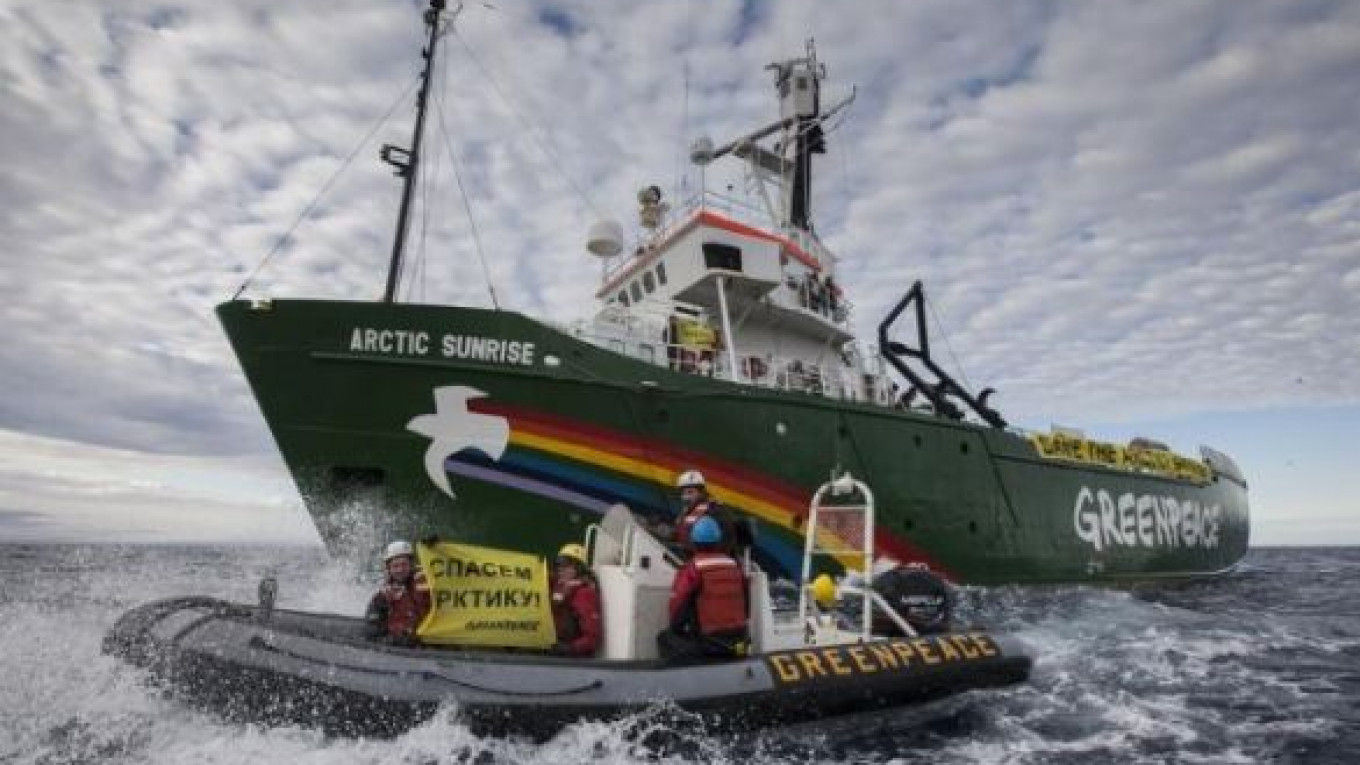At least 25 Greenpeace activists, most of them foreigners, face up to 15 years in prison on what many consider dubious piracy charges over a stunt last Wednesday that saw two of them climb a Gazprom-owned oil rig in Arctic waters to protest its drilling plans.
More than 54 nongovernmental groups and 370,000 people from around the world have called on? Russia to free the activists onboard the Arctic Sunrise icebreaker, Greenpeace said on its website Tuesday, arguing that "a peaceful protest against oil exploration in the Arctic cannot be tied to the legal definition of piracy."
Investigators have painted a more menacing picture, however, saying in a statement Tuesday that they have "logical doubts about their [the Greenpeace crew's] intentions" given that the icebreaker was "packed with electronics of unclear use." Investigators also said the crew "tried to storm" the rig.
On Tuesday evening, Russian authorities ordered the crew to collect their belongings within five minutes so that they could be transported to land, Greenpeace spokeswoman Tatyana Vasilyeva told Interfax. It was unclear where they would be taken after that, she said.
The crew comes from 19 countries, Greenpeace said, while the ship flies under the Dutch flag.
The ship was earlier towed by Russian coastguards to Russia's northern port of Murmansk on Tuesday, an unidentified representative of the regional branch of the Border Guard Directorate of the Federal Security Service told Interfax. ?
Soon after it cast its anchor in the Kola Bay, investigators announced the criminal case against the crew on piracy charges over the "attempt to board" the Prirazlomnaya rig without permission, the Investigative Committee said on its website.
The charges carry a maximum term of 15 years in prison.
Diplomats from 18 countries boarded the ship on Tuesday to discuss the situation, RIA Novosti reported, citing a post on Greenpeace Russia's Twitter. The original post has since been removed.
According to RIA, there were citizens from Russia, the U.S., Britain, France, Italy, Ukraine, Canada, New Zealand, Denmark, Argentina, the Netherlands, Australia, Brazil, Turkey, Finland, Poland, Sweden and Switzerland on board the ship.
The Embassy of the Netherlands redirected an inquiry about the matter to its Foreign Ministry in The Hague. Repeated calls and an e-mail to the ministry's Communications Department went unanswered Tuesday.
A spokeswoman at the Embassy of New Zealand, which had two of its citizens among the Arctic Sunrise crew, redirected an inquiry to the Foreign Ministry in Wellington, which is eight hours ahead of Moscow time.? ? ? ?
While it is unlikely that piracy charges would hold up in court, the crew could face prosecution for illegal trespassing, said Viktoria Zhdanova, a senior lawyer at Inmarine, a St. Petersburg-based legal firm specializing in maritime law.
Zhdanova said that she saw no legal grounds to prosecute the crew for piracy but that the charge of illegally trespassing a border was feasible, since the Russian rig is considered Russian territory even when in international waters.
"I do not think that the Greenpeace activists should be imprisoned, especially since there are citizens who fall under the jurisdiction of other countries, which complicates matters," Zhdanova said by telephone, adding that the crew should just be fined and sent home.
Greenpeace has denied the piracy charges, saying the definition of piracy by international and domestic laws implies the seizure of a vessel using violence or a threat of violence in order to gain possession of its property or holding its crew or passengers hostage.? ? ?
Greenpeace claims that its activists only wanted to "attract attention" to a possible oil spill at Prirazlomnaya, which would be an "ecological catastrophe," it said in a statement Tuesday.
In addition, Greenpeace said earlier that its ship had been in international waters, meaning it could not face punishment under Russian law.
Investigators disagreed, however, saying the Arctic Sunrise was seized in Russia's exclusive economic zone.
Furthermore, they said, the actions of the icebreaker's crew could have led to a breakdown of the rig, which would have undermined the security of its workers and the environment that the activists were "so fervently protecting."? ?
Investigative Committee spokesman Vladimir Markin said on the committee's website that "all people who carried out the attack on the rig will be held criminally liable, regardless of their citizenship."
This is not the first time the Arctic Sunrise has found itself in trouble with Russian authorities. In late August, it was denied entry to the Northern Sea Route by Russia's Northern Sea Route Administration, which cited technical reasons for the move.
Greenpeace has frequently targeted offshore activities in the Arctic, warning that drilling could cause devastation to fish and wildlife in the remote and icy region.
Russia's exploration of the area has been gaining momentum in recent months after state-owned giants Rosneft and Gazprom received the rights to five resource-rich sections of Russia's Arctic shelf by government decree in June.
Contact the author at n.krainova@imedia.ru
A Message from The Moscow Times:
Dear readers,
We are facing unprecedented challenges. Russia's Prosecutor General's Office has designated The Moscow Times as an "undesirable" organization, criminalizing our work and putting our staff at risk of prosecution. This follows our earlier unjust labeling as a "foreign agent."
These actions are direct attempts to silence independent journalism in Russia. The authorities claim our work "discredits the decisions of the Russian leadership." We see things differently: we strive to provide accurate, unbiased reporting on Russia.
We, the journalists of The Moscow Times, refuse to be silenced. But to continue our work, we need your help.
Your support, no matter how small, makes a world of difference. If you can, please support us monthly starting from just $2. It's quick to set up, and every contribution makes a significant impact.
By supporting The Moscow Times, you're defending open, independent journalism in the face of repression. Thank you for standing with us.
Remind me later.


